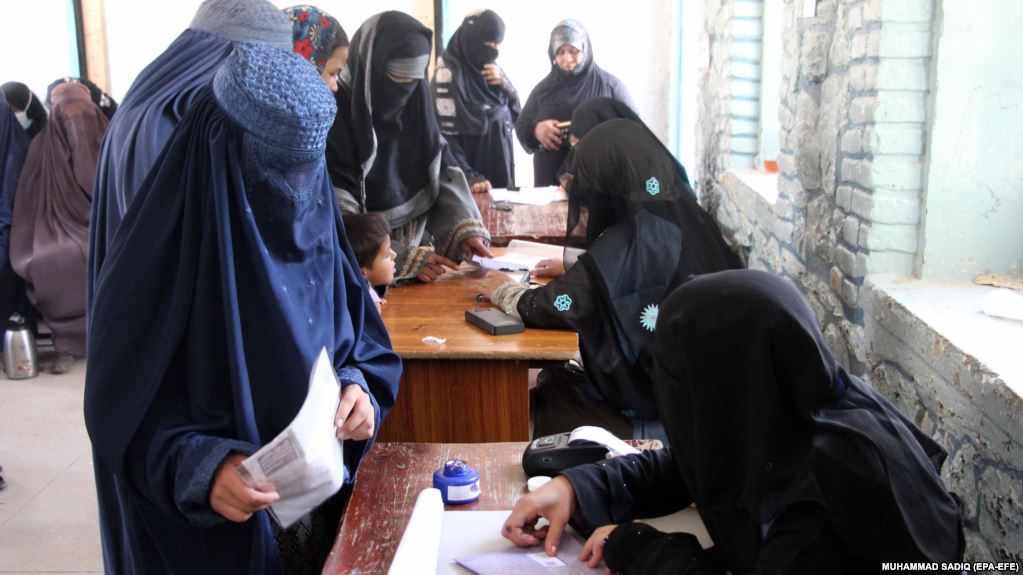By Frud Bezhan
With increased talk of peace in Afghanistan, the Taliban is projecting itself as a more moderate force, pledging to grant women their rights and allow them to work and go to school.
The Taliban said in a February 5 statement that it was committed to guaranteeing women their rights — under Islam — and “in a way that neither their legitimate rights are violated nor their human dignity and Afghan values are threatened.”
However, in the same statement, issued during talks between Taliban representatives and an Afghan delegation led by former President Hamid Karzai in Moscow, the Taliban also suggested it wants to curtail the fragile freedoms gained by women since the U.S.-led invasion ousted the militants in 2001, prompting concern among Afghan rights campaigners.
The statement comes after U.S. and Taliban officials, meeting in Doha in late January, agreed in principle to the “framework” of a peace deal aimed at ending Afghanistan’s 17-year war.
‘Immorality, Indecency’
The Taliban ruled Afghanistan from 1996-2001 with a fundamentalist and often brutal interpretation of Islamic law.
The extremist group was notorious for its treatment of women, banning most of them from working or going to school and lashing those who broke their strict edicts.
In its recent statement, the Taliban said that it “considers woman as the builders of a Muslim society and is committed to all rights of women that have been given to them by the sacred religion of Islam.”
The Taliban said Islam gave women rights in areas including “business and ownership, inheritance, education, work, choosing one’s husband, security, health, and the right to a good life.”
But the Taliban also denounced “so-called women’s rights activists” who were encouraging women to break Afghan customs.
“Due to corruption, the expenses brought and spent under the title of women rights have gone to the pockets of those who raise slogans of women rights,” the English-language statement said.
“Under the name of women’s rights, there has been work for immorality, indecency, and the promotion of non-Islamic cultures,” the Taliban said in the statement.
‘Dark Years Of Dictatorship’
The militants’ statement provoked anger from Afghan rights campaigners.
Samira Hamidi, an Afghan women’s rights activist, said the Taliban’s statement “reaffirms women’s concerns.”
“According to them, we are so-called activists” and “we are responsible for poor health, lack of education, and violence against women,” Hamidi said on Twitteron February 5, adding that someone should remind the militants of their “dark years of dictatorship.”
“We have gained so much in the last 18 years, whatever the problems, that we do not want to go back to the Taliban period,” said Fawzia Koofi, a female member of the Afghan parliament and one of the two women in attendance at the Moscow talks.
“They need to align themselves with progress as Afghanistan is not turning back,” added Koofi. “Anyone who wants to do politics in Afghanistan needs to respect the human freedoms, including the rights of women.”
Ahmad Shuja Jamal, an Afghan analyst, said on Twitter that the Taliban’s statement shows “they oppose civil society, disdain women activists, [and] want to curtail women’s individual freedoms.”
“Worst of all, they don’t disavow their own brutality toward women,” said Jamal.
But the Taliban, in the same February 5 statement, demanded a new constitution based on “Islamic principles, national interests, historic pride, and social justice.”
Softer Image
The Taliban’s attempt to project a softer and more tolerant image comes as peace talks gain momentum.
On January 30, the Taliban said they were not seeking a “monopoly on power” in a future administration in Afghanistan but are looking for ways to coexist with Afghan institutions, in what was seen as the militants’ most conciliatory statement to date.
In December, Taliban spokesman Zabihullah Mujahid said “if peace comes and the Taliban returns, then our return will not be in the same harsh way as it was in 1996,” the year the Taliban took control of Kabul.
Mujahid said the Taliban were not against women’s education or employment but wanted to maintain cultural and religious codes.
“We are not against women working in government organizations or against their outdoor activities, but we will be against the alien-culture clothes worn by women, brought to our country,” Mujahid said.
But many Afghan women are still skeptical.
“While [the Taliban] are not ready to talk to women, they keep making laws for them,” said Wazhma Frogh, a women’s rights activist.



